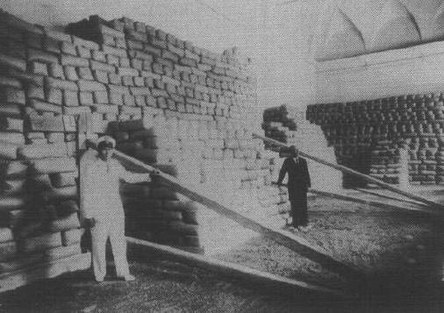Marie Skłodowska-Curie Action IF SICILYWAR

Introduction
Cultural Heritage in Danger: Archaeology and Communities in Sicily during the Second World War (1940-45) is a Marie Curie Skłodowska Individual Fellowship project, carried out at Ghent University by Dr. Antonino Crisà under the supervision of Prof. Jean Bourgeois. It investigates the impact of war on Sicilian antiquities for the first time, understanding how bombing and military activities put preservation of the island’s archaeological sites and museums at serious risk. The investigation benefits from a variety of data, which include archival records, B/W pictures, maps, military dispatches and aerial photographs. SICILYWAR is a two-year ERC funded research project (2019-2021).
Project description
Italy entered WW2 on 10 June 1940 following the declaration of war by Benito Mussolini. As a nation rich of cultural, historical and archaeological heritage, Italy urged to actualise an effective plan to protect antiquities against any potential aerial and land military attack. Therefore, Giuseppe Bottai, Minister of National Education, imposed strict laws to defend monuments and museums on a national and regional scale. Sicily, one of the richest Italian regions in terms of archaeological heritage, was bombed many times by the Allied forces. The effect of bombing and military operations on Sicilian antiquities are still little known, even if the island was the main theatre of a substantial military defensive plan and a massive landing/invasion operations by the Allied forces in summer 1943.
SICILYWAR aims to fill this gap in current scholarship providing a novel assessment of available records from national and international archives, including dispatches, letters and B/W pictures. Documentation will be complemented with archaeological data, which allow us to obtain a thorough historical reconstruction of events. Such information is essential to better understand the effect of war on the island’s archaeological sites and museums, and all social networks between civilian communities, state and military authorities.
Objectives
These are the objectives of SICILYWAR:
- Understanding how WW2 impacted on Sicilian archaeology (sites and museums).
- Identifying essential networks between civilian and military authorities (Italian, German and Allied ones) which operated in a state of war and often clashed to protect or militarise archaeological sites.
- Assessing the effectiveness of cultural heritage protection plans carried out by local safeguarding authorities.
Role of Ghent University
The Department of Archaeology at Ghent University hosts the research project under the supervision of Prof. Jean Bourgeois. The project fits into a well-established department’s scholarship and complements currents strengths in WW1 archaeology, cultural heritage and aerial photography studies.
Website
Contact
Antonino Crisà
Department of Archaeology
Phone number: 09 331 01 57
E-mail